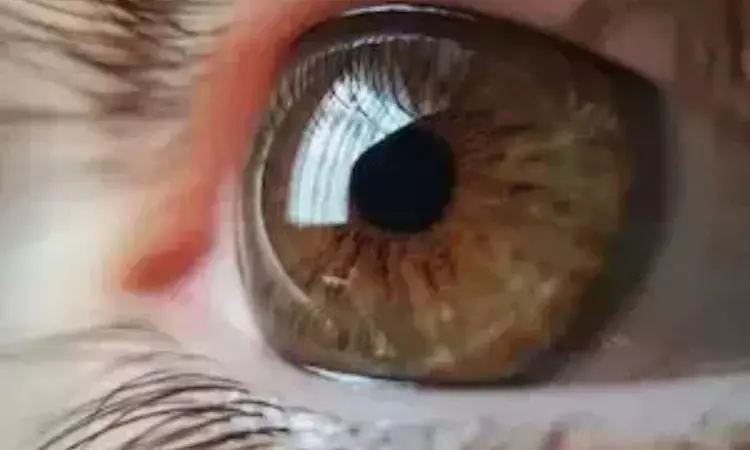- Home
- Medical news & Guidelines
- Anesthesiology
- Cardiology and CTVS
- Critical Care
- Dentistry
- Dermatology
- Diabetes and Endocrinology
- ENT
- Gastroenterology
- Medicine
- Nephrology
- Neurology
- Obstretics-Gynaecology
- Oncology
- Ophthalmology
- Orthopaedics
- Pediatrics-Neonatology
- Psychiatry
- Pulmonology
- Radiology
- Surgery
- Urology
- Laboratory Medicine
- Diet
- Nursing
- Paramedical
- Physiotherapy
- Health news
- Fact Check
- Bone Health Fact Check
- Brain Health Fact Check
- Cancer Related Fact Check
- Child Care Fact Check
- Dental and oral health fact check
- Diabetes and metabolic health fact check
- Diet and Nutrition Fact Check
- Eye and ENT Care Fact Check
- Fitness fact check
- Gut health fact check
- Heart health fact check
- Kidney health fact check
- Medical education fact check
- Men's health fact check
- Respiratory fact check
- Skin and hair care fact check
- Vaccine and Immunization fact check
- Women's health fact check
- AYUSH
- State News
- Andaman and Nicobar Islands
- Andhra Pradesh
- Arunachal Pradesh
- Assam
- Bihar
- Chandigarh
- Chattisgarh
- Dadra and Nagar Haveli
- Daman and Diu
- Delhi
- Goa
- Gujarat
- Haryana
- Himachal Pradesh
- Jammu & Kashmir
- Jharkhand
- Karnataka
- Kerala
- Ladakh
- Lakshadweep
- Madhya Pradesh
- Maharashtra
- Manipur
- Meghalaya
- Mizoram
- Nagaland
- Odisha
- Puducherry
- Punjab
- Rajasthan
- Sikkim
- Tamil Nadu
- Telangana
- Tripura
- Uttar Pradesh
- Uttrakhand
- West Bengal
- Medical Education
- Industry
Immunomodulatory Therapy bests Steroids in Multifocal Choroiditis Patients with Choroidal Neovascularization

Multifocal Choroiditis (MFC) patients with inflammatory choroidal neovascularization (iCNV) face challenges in visual and treatment outcomes. A recently published study delves into the effectiveness of Immunomodulatory Therapy (IMT) compared to an approach using steroids as needed, shedding light on visual and treatment outcomes. This study was published in the American Journal of Ophthalmology by Matteo Airaldi and colleagues.
Dividing MFC patients into IMT and steroid groups, outcomes were compared over a 2-year follow-up. Parameters included visual acuity (VA), anti-Vascular Endothelial Growth Factor injections (IVIs), and iCNV reactivations. The influence of MFC-related inflammation on iCNV reactivation risk was also examined. Conducted as a multicenter retrospective matched cohort study, the research scrutinized patients with MFC and iCNV. The two groups, IMT and "steroids as needed," were meticulously matched based on the time from diagnosis to the initiation of systemic treatment.
The key findings of the study were:
iCNV Reactivation and IVI Retreatment:
The IMT group displayed a lower relative risk (RR) of iCNV reactivation (RR: 0.64, p = 0.04).
Similarly, the RR of IVI (intravitreal injections) retreatment was reduced in the IMT group (RR: 0.59, p = 0.02).
Relapses and iCNV Reactivation:
Relapses of MFC-related inflammation were independently associated with a higher RR of iCNV reactivation (RR: 1.22, p = 0.003).
Visual Acuity (VA):
Final VA was notably higher in the IMT group compared to "steroids as needed" (mean: 69.1 vs. 77.1 letters, p = 0.01).
IMT demonstrated superior VA gains over time (+2.5 letters/year, p = 0.04).
IMT offers superior outcomes for MFC patients with iCNV compared to "steroids as needed". Tighter control of inflammation is crucial, emphasizing the need for comprehensive management strategies. The study underscores the superiority of IMT over the "steroids as needed" approach in managing iCNV in MFC. Tighter control of inflammation, highlighted by the association between MFC-related inflammation and iCNV reactivations, emerges as a crucial strategy for preventing visual deterioration.
Reference:
Dr Riya Dave has completed dentistry from Gujarat University in 2022. She is a dentist and accomplished medical and scientific writer known for her commitment to bridging the gap between clinical expertise and accessible healthcare information. She has been actively involved in writing blogs related to health and wellness.
Dr Kamal Kant Kohli-MBBS, DTCD- a chest specialist with more than 30 years of practice and a flair for writing clinical articles, Dr Kamal Kant Kohli joined Medical Dialogues as a Chief Editor of Medical News. Besides writing articles, as an editor, he proofreads and verifies all the medical content published on Medical Dialogues including those coming from journals, studies,medical conferences,guidelines etc. Email: drkohli@medicaldialogues.in. Contact no. 011-43720751


